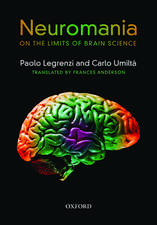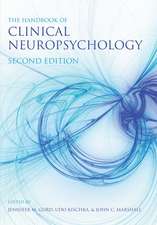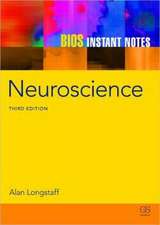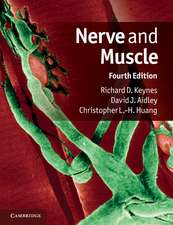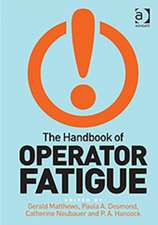Transient Receptor Potential Canonical Channels and Brain Diseases: Advances in Experimental Medicine and Biology, cartea 976
Editat de Yizheng Wangen Limba Engleză Paperback – 9 mai 2018
| Toate formatele și edițiile | Preț | Express |
|---|---|---|
| Paperback (1) | 836.83 lei 38-44 zile | |
| SPRINGER NETHERLANDS – 9 mai 2018 | 836.83 lei 38-44 zile | |
| Hardback (1) | 1003.70 lei 3-5 săpt. | |
| SPRINGER NETHERLANDS – 23 mai 2017 | 1003.70 lei 3-5 săpt. |
Din seria Advances in Experimental Medicine and Biology
- 9%
 Preț: 719.60 lei
Preț: 719.60 lei - 20%
 Preț: 691.93 lei
Preț: 691.93 lei - 5%
 Preț: 717.00 lei
Preț: 717.00 lei - 5%
 Preț: 716.28 lei
Preț: 716.28 lei - 5%
 Preț: 717.20 lei
Preț: 717.20 lei - 15%
 Preț: 640.24 lei
Preț: 640.24 lei - 5%
 Preț: 1113.83 lei
Preț: 1113.83 lei - 5%
 Preț: 715.71 lei
Preț: 715.71 lei - 5%
 Preț: 820.43 lei
Preț: 820.43 lei - 15%
 Preț: 641.38 lei
Preț: 641.38 lei - 5%
 Preț: 716.28 lei
Preț: 716.28 lei - 5%
 Preț: 523.99 lei
Preț: 523.99 lei - 5%
 Preț: 1031.00 lei
Preț: 1031.00 lei - 5%
 Preț: 717.00 lei
Preț: 717.00 lei - 5%
 Preț: 715.35 lei
Preț: 715.35 lei - 20%
 Preț: 1161.71 lei
Preț: 1161.71 lei - 5%
 Preț: 1170.51 lei
Preț: 1170.51 lei - 18%
 Preț: 1119.87 lei
Preț: 1119.87 lei - 5%
 Preț: 1288.48 lei
Preț: 1288.48 lei - 5%
 Preț: 1164.67 lei
Preț: 1164.67 lei - 5%
 Preț: 1101.73 lei
Preț: 1101.73 lei - 18%
 Preț: 1123.67 lei
Preț: 1123.67 lei - 5%
 Preț: 1435.64 lei
Preț: 1435.64 lei - 20%
 Preț: 1044.10 lei
Preț: 1044.10 lei - 18%
 Preț: 946.39 lei
Preț: 946.39 lei - 5%
 Preț: 292.57 lei
Preț: 292.57 lei - 18%
 Preț: 957.62 lei
Preț: 957.62 lei - 18%
 Preț: 1235.76 lei
Preț: 1235.76 lei - 5%
 Preț: 1231.55 lei
Preț: 1231.55 lei - 5%
 Preț: 1292.30 lei
Preț: 1292.30 lei - 5%
 Preț: 1102.10 lei
Preț: 1102.10 lei - 18%
 Preț: 1132.81 lei
Preț: 1132.81 lei - 5%
 Preț: 1165.19 lei
Preț: 1165.19 lei - 5%
 Preț: 1418.48 lei
Preț: 1418.48 lei - 5%
 Preț: 1305.63 lei
Preț: 1305.63 lei - 18%
 Preț: 1417.72 lei
Preț: 1417.72 lei - 18%
 Preț: 1412.99 lei
Preț: 1412.99 lei - 24%
 Preț: 806.16 lei
Preț: 806.16 lei - 18%
 Preț: 1243.29 lei
Preț: 1243.29 lei - 5%
 Preț: 1429.44 lei
Preț: 1429.44 lei - 5%
 Preț: 1618.70 lei
Preț: 1618.70 lei - 5%
 Preț: 1305.12 lei
Preț: 1305.12 lei - 18%
 Preț: 1124.92 lei
Preț: 1124.92 lei - 5%
 Preț: 1097.54 lei
Preț: 1097.54 lei - 15%
 Preț: 649.87 lei
Preț: 649.87 lei - 5%
 Preț: 1097.54 lei
Preț: 1097.54 lei - 18%
 Preț: 945.79 lei
Preț: 945.79 lei - 5%
 Preț: 1123.16 lei
Preț: 1123.16 lei
Preț: 836.83 lei
Preț vechi: 1101.09 lei
-24% Nou
Puncte Express: 1255
Preț estimativ în valută:
160.13€ • 174.48$ • 134.93£
160.13€ • 174.48$ • 134.93£
Carte tipărită la comandă
Livrare economică 19-25 aprilie
Preluare comenzi: 021 569.72.76
Specificații
ISBN-13: 9789402414868
ISBN-10: 940241486X
Pagini: 165
Ilustrații: VIII, 165 p. 16 illus., 15 illus. in color.
Dimensiuni: 178 x 254 mm
Greutate: 0.45 kg
Ediția:Softcover reprint of the original 1st ed. 2017
Editura: SPRINGER NETHERLANDS
Colecția Springer
Seria Advances in Experimental Medicine and Biology
Locul publicării:Dordrecht, Netherlands
ISBN-10: 940241486X
Pagini: 165
Ilustrații: VIII, 165 p. 16 illus., 15 illus. in color.
Dimensiuni: 178 x 254 mm
Greutate: 0.45 kg
Ediția:Softcover reprint of the original 1st ed. 2017
Editura: SPRINGER NETHERLANDS
Colecția Springer
Seria Advances in Experimental Medicine and Biology
Locul publicării:Dordrecht, Netherlands
Cuprins
TRP channel classification.- TRPC channel structure and properties.- TRPC channel downstream signaling cascades.- TRPC Channels in Health and Disease.- TRPC channels and programmed cell death.- TRPC channels and stroke.- TRPC channels and Alzheimer’s disease.- TRPC channels and Parkinson’s disease.- TRPC channels and neuron development, plasticity and activities.- TRPC channels and brain inflammation.- TRPC channels and Epilepsy.- TRPC channels and mental disorders.- TRPC channels and cell proliferation.- TRPC channels and glioma.
Notă biografică
Dr. Yizheng Wang is a senior investigator at the Institute of Neuroscience, Shanghai Institutes for Biological Sciences, Chinese Academy of Sciences. He is the leader of the Laboratory of Neuronal Signal Transduction and an executive director of the Chinese Society for Neuroscience and Chinese Society of Biochemistry and Molecular Biology. His research focuses on the function and regulation of TRPC channels in neural development and diseases, a field in which he has published more than 40 research articles.
Textul de pe ultima copertă
This book discusses the latest findings on the physiological and pathological functions of transient receptor potential canonical/classical (TRPC) proteins in the brain. In addition to reviewing the functions of TRPCs in brain development and neuron transmission, it mainly covers the potential roles of TRPCs in brain disorders. TRPC proteins belong to the TRP channel superfamily, which has around 30 members. Just like TRP channels, TRPCs are non-selectively permeable to cations, with a selectivity of calcium over sodium that varies among different members. The TRPC subfamily consists of six members, grouped on the basis of the similarities in gene sequence and protein structure in mammalians. What sets TRPCs apart from other subfamilies in TRPs is that their activation, stimulated by a membrane receptor-phospholipid C (PLC) cascade, contributes to the slow and sustained elevation of intracellular free calcium. Calcium ions, one of the most important types of second messengers, mediate a variety of physiological functions in the brain, including progenitor cell proliferation, dendritic formation, synaptic transmission and neuronal survival. All TRPCs except TRPC7 have been found in various regions of the brain, including the cerebrum, cerebellum, forebrain and hippocampus. This book provides students and investigators with comprehensive information on the regulation, function and potential of TRPCs and brain diseases in order to attract more attention to this field.
Caracteristici
Discusses the findings on the physiological and pathological functions of TRPCs in the brain Covering the potential roles of TRPCs in brain disorders Providing students and investigators with comprehensive information on regulation, function and potential of TRPCs and brain diseases?



